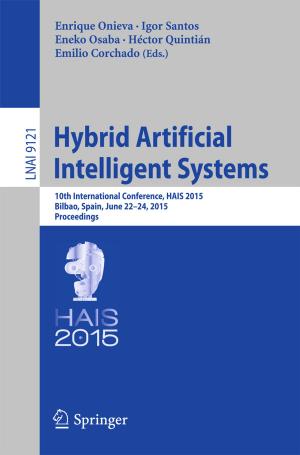Practical Applications of Computational Biology and Bioinformatics, 13th International Conference
Nonfiction, Science & Nature, Science, Biological Sciences, Physiology, Computers, Advanced Computing, Artificial Intelligence, General Computing| Author: | ISBN: | 9783030238735 | |
| Publisher: | Springer International Publishing | Publication: | June 21, 2019 |
| Imprint: | Springer | Language: | English |
| Author: | |
| ISBN: | 9783030238735 |
| Publisher: | Springer International Publishing |
| Publication: | June 21, 2019 |
| Imprint: | Springer |
| Language: | English |
This book features 21 papers spanning many different sub-fields in bioinformatics and computational biology, presenting the latest research on the practical applications to promote fruitful interactions between young researchers in different areas related to the field. Next-generation sequencing technologies, together with other emerging and diverse experimental techniques, are evolving rapidly, creating numerous types of omics data. These, in turn, are creating new challenges for the expanding fields of bioinformatics and computational biology, which seek to analyse, process, integrate and extract meaningful knowledge from such data. This calls for new algorithms and approaches from fields such as databases, statistics, data mining, machine learning, optimization, computer science, machine learning and artificial intelligence. Clearly, biology is increasingly becoming a science of information, requiring tools from the computational sciences. To address these challenges, we have seen the emergence of a new generation of interdisciplinary scientists with a strong background in the biological and computational sciences. In this context, the interaction of researchers from different scientific areas is, more than ever, vital to boost the research efforts in the field and contribute to the training of the new generation of interdisciplinary scientists.
This book features 21 papers spanning many different sub-fields in bioinformatics and computational biology, presenting the latest research on the practical applications to promote fruitful interactions between young researchers in different areas related to the field. Next-generation sequencing technologies, together with other emerging and diverse experimental techniques, are evolving rapidly, creating numerous types of omics data. These, in turn, are creating new challenges for the expanding fields of bioinformatics and computational biology, which seek to analyse, process, integrate and extract meaningful knowledge from such data. This calls for new algorithms and approaches from fields such as databases, statistics, data mining, machine learning, optimization, computer science, machine learning and artificial intelligence. Clearly, biology is increasingly becoming a science of information, requiring tools from the computational sciences. To address these challenges, we have seen the emergence of a new generation of interdisciplinary scientists with a strong background in the biological and computational sciences. In this context, the interaction of researchers from different scientific areas is, more than ever, vital to boost the research efforts in the field and contribute to the training of the new generation of interdisciplinary scientists.















